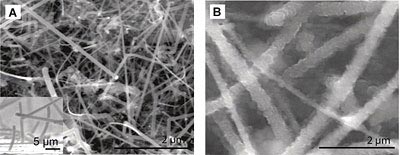Laptop batteries operate for 20 hours thanks to nanowire technology
Experts at Stanford University (USA) have redesigned the Lithium-Ion battery with a semiconductor nanowire structure, allowing the ability to charge power 10 times more than today.
Yi Cui, the school's professor of materials science, and chemistry engineer Candace Chan and five others wrote a project to boost the battery's strength. Technology can also be applied to electric cars because solar energy is more efficient than existing products.
Lithium-Ion batteries currently only store lithium at carbon anodes. Silicon semiconductor anodes can store more energy but tend to fail faster. However, the battery that Cui developed saved lithium in countless nanoscale silicon wires that made molecular bonds unbreakable.

Nanoscale silicon wire before lithium (left) absorbs lithium (right).
Viet Toan
You should read it
- ★ 'Dissecting' Lithium batteries to find out the cause of the fire due to backup charging?
- ★ Battery thin-film - A safe alternative to lithium-ion batteries
- ★ Learn about some Battery technologies
- ★ Causes and ways to detect iPhone batteries are about to explode
- ★ What is solid battery? Will they solve the battery life problem?